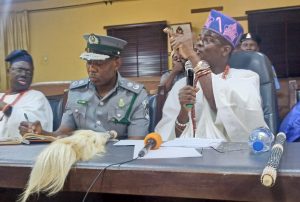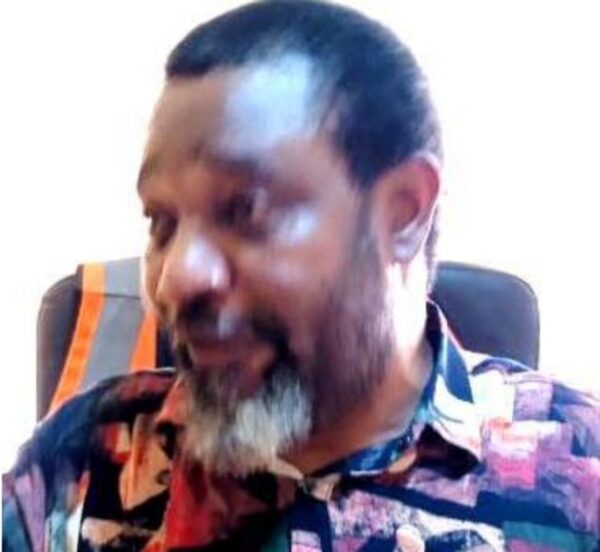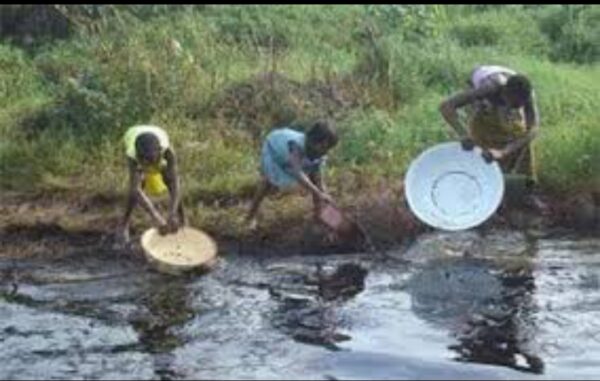Comptroller Nnadi’s Leadership Masterclass, Advocacy And Engagements
By Kenneth Jukpor
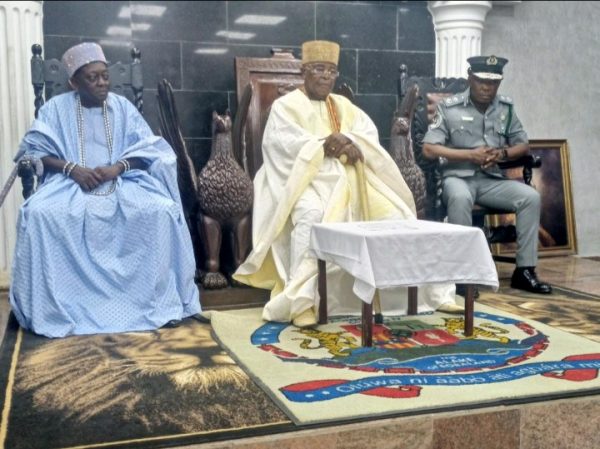
Effective leadership is not about making speeches or being liked; leadership is defined by results not attributes —Peter Drucker
While this apt saying captures the underlying factors to measure the performance of any leader, a good leader would attain a level of likeness occasioned by good attributes that would further spur followers or subordinates to remain committed and result-driven.
Few weeks ago, Comptroller Dera Nnadi was appointed as the Customs Area Controller at the Ogun 1 Command and his team has already intercepted 7311 bags of 50kg rice and several seizures worth over N172million.
The Area Controller, Comptroller Nnadi also led a managerial delegation of his team to engage the royalties in the State especially those in the border regions even as he visited the Ogun State Governor.
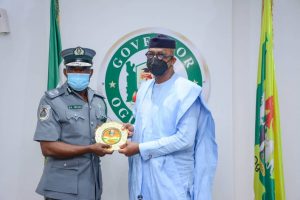
While the underlying purpose of these visits was to strike a partnership in a bid to curb smuggling activities in the border regions and guarantee a seamless relationship between Customs officers and Ogun citizens; the rapport also availed the new Customs boss firsthand accounts of some alleged unpalatable activities of Customs as well as a better understanding of the perception of Customs officers held by its host community.
During the voyages, MMS Plus also spotted some transformational and laissez-faire leadership traits that have seemingly positioned the Ogun 1 Customs Command in an advantageous place to attain its goals. Some of these tenets were captured in the experiences, actions and inactions of the Customs boss and they could be replicated for success in various leadership structures.
Addressing the Yewa Traditional Council also known as the Council of Obas, Comptroller Nnadi said; “I’m here to tell you that I’ve come to serve Ogun State and particularly Yewa Land. I am your servant and I am your subject. Customs activities cut across your domain and NCS in Ogun 1 Command has one mandate which is to recognize the fact that Ogun State is a strategic economic gateway to Nigeria. Ogun isn’t just a gateway but a main gateway and Yewa Land is the heart of that gateway. According to the National Bureau of Statistics (NBS), Ogun State is ranked 4th in the contribution to national GDP. Almost 80% of the GDP contribution of Ogun State comes from Yewa Land, so it is important that I have come here to discuss with this council of royalties.”
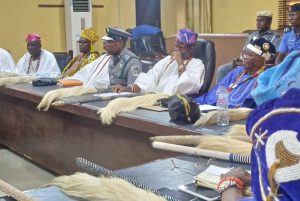
The Customs boss assured the royalties that his administration would prioritize collaboration instead of wars, encouraging the rulers to educate their subjects on the effects of smuggling on the nation’s economy and correct the impression that the Ogun State border region is a war-zone.
Comptroller Nnadi recalled that the people of Yewa Land were historically known as peaceful industrious traders, admonishing the leaders to curb the excesses of the indigenes especially youths who have taken to smuggling and attacking Customs officers.
Noting that two Customs officers were recently murdered in Yewa Land, Nnadi stressed that the community shouldn’t be known for such dreadful acts but return to the glorious historical days of peace as enunciated in the literary accounts of Samuel Johnson, Anthony Asiwaju and Kola Afolayan who wrote about the people of Yewa Land.
On his part, the Paramount ruler of Yewa Land, Oba Kehinde Olugbenle, noted that the pangs of unemployment and grueling hardship since the closure of the land border had seen Yewa Land youths become easily susceptible to partner smugglers.
The Paramount ruler, Olugbenle stressed that the onus of safeguarding the border area remains a huge task for Customs with over 1,100 unapproved routes within the community and encouraged the government to provide barricades and modern infrastructure that befits a border region.
Despite the numerous dissatisfactions enumerated by members of the Council, the rulers were convinced that Ogun 1 Customs under Comptroller Nnadi would address the loopholes and Customs excesses. As proof that they would support the new Customs team, they gathered to pray for the new Area Controller, his leadership and the entire Customs officers in the region.
The Customs delegation also visited the Agura of Gbogura Kingdom, Oba Saburi Babajide Bakare and the Alakin of Egbaland, HRM Oba (Dr.) Michael Adedotun Gbadebo were assurances of partnerships were also obtained as the royalties united to host the Customs boss at the Mayfair Executive hotel in Abeokuta.
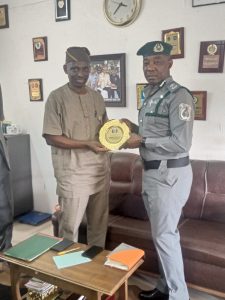
In a bid to ensure the eradication of incessant clashes between the personnel of Customs and the citizens at the border regions in Ogun State, Comptroller Nnadi also promised to synergize with the State government.
The Customs Area Controller who gave this assurance when he paid a courtesy visit to the Ogun State Governor, Prince Dapo Abiodun at his office in Okemosan, Abeokuta, posited that the synergy would help to facilitate trade and also promote peaceful coexistence between the people and Customs officers.
However, the governor assured the customs boss of his utmost support as part of the vision of the current administration at the gateway state in achieving a proactive security arrangement for the safety of people working and living in the state being the industrial hub of the nation.
A retired Comptroller, Rasheed Taiwo, was a key figure who played a role in accompanying Comptroller Nnadi to the Alakin of Egbaland, HRM Oba (Dr.) Michael Adedotun Gbadebo and also facilitated the visit to the Ogun State Governor, Prince Dapo Abiodun.
Comptroller Taiwo was regarded as a refined Customs officer and well-revered disciplinarian. His story was told glowingly by the new Customs boss, Comptroller Nnadi who stated emphatically that Comptroller Taiwo had played the role of a great mentor in his career.
It’s a story that inspired the young officers who accompanied the Customs Area Controller on the tour to royal palaces and other stakeholders.
At the end of the first day of the tour, the Area Controller gathered his escorts to thank them for their time and exemplary service that day. Some of the officers barely had time to eat all day as they stood on guard, dutifully serving, and the Customs boss noted that he was particularly aware that it was a sunny and windy day, yet the officers braced the weather to serve. He prayed that they would have people to serve them so dutifully in future as they grow in the service.
Subsequently, he narrated his first meeting with Comptroller Taiwo at Idiroko. Nnadi had accompanied the then Customs National PRO, Comptroller Wale Adeniyi to a national event. At that period, Nnadi was serving as the Customs PRO at Apapa Command and after the programme, Comptroller Taiwo who was heading the Ogun Customs Command asked to be informed about the activities at Apapa Command. Nnadi respectfully declined stressing that Taiwo wasn’t posted to Apapa and as such he wouldn’t avail him details of the activities at Apapa. Not even the intervention by his then PRO boss, Wale would make Nnadi change his stance on the matter.
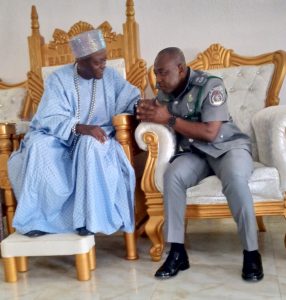
Few weeks after that incident, Comptroller Taiwo was posted to Apapa as the Area Controller and those who knew the story of Nnadi’s refusal to tell Taiwo anything about Apapa had warned Nnadi to run away before the new Area Controller showed up. Nnadi’s dilemma was further complicated by the fact that the out-going CAC at the time hurriedly handed over the official notes to him.
Given the circumstances, Nnadi wouldn’t just serve his new boss as PRO, he also had to personally give the handover notes to Comptroller Taiwo. The young PRO smartly handed over the notes and excused himself, only to be recalled by Comptroller Taiwo who asked him the same question again. This time, Nnadi would tell him about the command and he gladly gave all necessary details. Nnadi eventually played a key role in Taiwo’s administration at Apapa as he knew boss held no grudges, instead he provided quality mentored for Nnadi.
Considerable attention has been given to oral literature in Africa. Oral literature, as regards children lullaby, children rhymes and moonlight tales are not left out. However, it is one thing to tell a story of one’s personal experiences with values to be learnt, and it is a completely different matter to capture your audience’s attention and leave them inspired by the tale.
On the ride back to their lodge, the young Customs officers remarked that no one ever saw a need to thank them after such gallantry in escort because their service is a given. One of the officers said, “If I don’t eat tonight, I will still be satisfied just by the words of encouragement that have come from the Area Controller and his prayers. This is what leadership is about. This man is unique. Other Controllers wouldn’t even stop to say hi or goodnight after such trips.”
You’ll need to be a literary inclined leader to have scouted the history of Yewa Land and the historical accounts written by Samuel Johnson, Anthony Asiwaju and Kola Afolayan who wrote about the people of Yewa Land, to have armed yourself with good deeds to discuss with the Council of Obas at Yewa Land; nevertheless it’s priceless humility to insist that you know all the titles of the Council’s leader to address him appropriately even though you’re already familiar with him and have visited him on several occasions.
These are some qualities of a good leader and lessons for effective leadership observed by our correspondent during the tour.
When a Customs officer seizes a bag of foreign rice that has been smuggled into the country, that’s simply the statutory job of Customs which is a thankless one like that of an auditor, but to deliberately emphasize how such activity affects the Nigerians and the nation’s economy is a masterstroke.
“If allowed into the Nigerian market this smuggled rice will affect the federal government rice policy negatively. Recall that a rice cooperative farm in Ogun State, specifically at Imeko Afon with the active support of the Central Bank of Nigeria, Federal Government and World Bank just last week harvested 2600 metric tons of paddy rice,” he said.
While he noted that the 2600 metric tons of rice wouldn’t satisfy the needs of the Nigerian market, he opined that Imeko’s production is just one aspect of production as there are several rice producing farms across the nation.
Other seizures recorded in their various quantities during the same period include: 12 kegs of 25 liters size that is 300 liters of vegetable oil, 20 units of used vehicles as means of conveyance, 2 used motorcycles as means of conveyance, 4 bales of 25kg each and sacks, 26 sacks of used shoes, 124 sacks of booksize and 165 coconut-size cannabis sativa, 831 kegs of 25 liters of PMS, 4 sacks of used toys and 810 cartons of frozen poultry products.
“The cumulative duty paid value (DPV) for all the above seizures amounted to N172,999,387.00. The Command generated a total revenue of N2,437,050.00 during the period under review, which are mainly proceeds of suction sales of seized petroleum products (PMS) and scrap metals. It should be noted that the Federal Government of Nigeria’s directive on border closure is still subsisting, hence, there is no revenue generated from imports activities,” he said.
Comptroller Nnadi also commended the Customs management for the support and encouragement to Ogun I Command, noting that the Command has just taken delivery of 10 units of brand new Toyota Hilux vehicles.
While it’s still early days of Nnadi’s administration at the Ogun 1 Command, one can learn from the transformational and laissez-faire leadership styles of the Customs boss.
Transformational leadership is a leadership style in which leaders encourage, inspire and motivate employees to innovate and create change that will help grow and shape the future success of the company. This is accomplished by setting an example at the executive level through a strong sense of corporate culture, employee ownership and independence in the workplace.
On the other hand, laissez-faire leaders are very successful because they hone an attitude of trust and can rely on their employees. They don’t micromanage or get too involved; they don’t give too much instruction or guidance. They give guidance and take responsibility where needed, but this leadership style means that subordinates and team members have the real lead.



